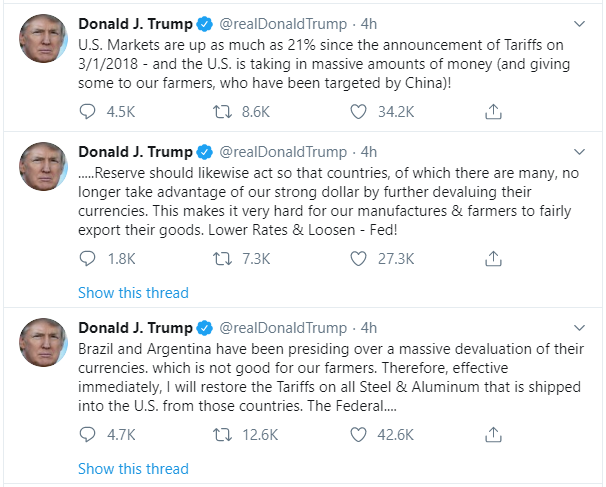Government/Policy

December 2, 2019
CRU: U.S. Steelmakers Set to Lose as Trump Moves to Reinstate S232 Tariffs on Brazil
Written by Josh Spoores
By CRU Principal Analyst Josh Spoores, from the CRU Steel Monitor
President Trump sent three tweets this morning that said, effective immediately, he would restore the steel and aluminum tariffs on Brazil and Argentina because the countries “have been presiding over a massive devaluation of their currencies, which is not good for our farmers.” No formal announcement has been made on the White House website.

This reinstitution is designed to get these countries to strengthen their currencies versus the U.S. dollar. Is this action legal, and will it strengthen these currencies versus the U.S. dollar? We suspect the answer is no on both accounts.
Trump used the currency devaluation justification to increase Turkey’s Section 232 tariffs to 50 percent from 25 percent in March 2018. A recent Supreme Court ruling, however, determined that the president did not have the authority to increase S232 tariffs on Turkey since the investigation time frame had ended. Therefore, we expect these increases on Argentina and Brazil to be challenged.
In the meantime, do these tariffs help U.S. steelmakers? In our view, the answer is no. Multiple steelmakers in the U.S. import slab from Brazil and most of them own slab in bonded warehouses today. These steelmakers expect to transfer the slab beginning Jan. 2 in order to bring the slab in when the current quota renews for 2020 Q1. Steelmaking costs for multiple mills in the U.S. will increase because of this decision. We currently count as many as seven steelmakers in the U.S. that import slab from Brazil.
While these new tariffs are being instituted and challenged, we believe that Stelco in Canada may be a winner with this decision. Canadian steelmakers are exempted from the S232 tariffs, and Stelco is able to roll low-priced slab and sell sheet to the U.S. market. In fact, this mill has an outage in 2020 H1 where they are relining their furnace, and this decision by the U.S. may allow them to source cheaper slab than they previously anticipated.
In conclusion, we expect a quick court challenge to this decision and do not anticipate that these increased S232 tariffs will be upheld. Meanwhile, this market distortion will neither help American farmers nor steelmakers. Some steelmakers will face a higher cost of goods, while steel consumers will continue to face the decision of importing steel-intensive goods rather than manufacture everything in the U.S.
Request more information about this topic.
Learn more about CRU’s services at www.crugroup.com







